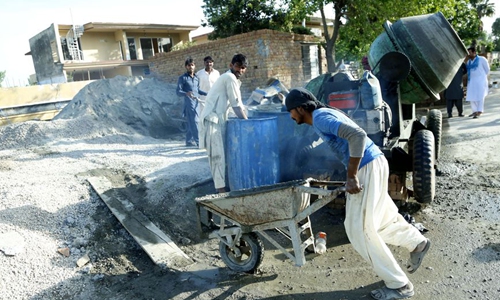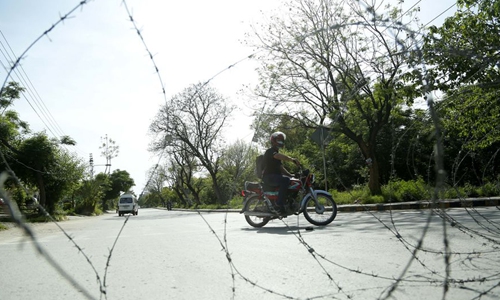Laborers wait to get hired on a road on the eve of the International Labor Day in Islamabad, capital of Pakistan on April 30, 2020. (Xinhua/Ahmad Kamal)
The announcement of the Pakistani government to employ tens of thousands of out-of-work laborers in the tree plantation campaign was like charcoal in the snowy weather for Muhammad Hafeez, who has been struggling to get by after losing his job due to the outbreak of the COVID-19 and the subsequent lockdown in Pakistan.
“I am a daily wage worker and used to earn a meagre amount for the sustenance of my family. Although my family always finds difficulty to make both ends meet with that amount, we would manage to live within our means,” Hafeez, a resident of Pakistan’s eastern district of Rawalpindi, told Xinhua.
“I work as a mason and when the construction work was in full bloom, it was somehow convenient to find work with a decent wage. Since the imposition of the lockdown in the country to stem the spread of the coronavirus, the situation has gone from bad to worse for me,” the 39-year-old man said.
Thanks to the recently launched “Green Stimulus” program by the Pakistani government, Hafeez could now make some 800 rupees (about 5 U.S. dollars) a day, enough to feed his 4-member family.
Considering the influence of the lockdown, the government introduced the green program as part of its efforts to extend green cover in the country and to create job opportunities in the wake of the COVID-19 crisis.

Laborers work at a construction site on the eve of the International Labor Day in Islamabad, capital of Pakistan on April 30, 2020.(Xinhua/Ahmad Kamal)
The newly designed green program is a part of the country’s ambitious “10 Billion Tree Tsunami” project launched to fight climate change-related adverse phenomena by planting hundreds of millions of trees in the next few years.
“The decision of providing employment through the tree plantation campaign is indeed a happy news for all those poor families like mine. It would prove a great solace in this crisis-like situation,” Hafeez said.
“In my village, thousands of saplings were planted during the previous tree plantation drive which greatly helped the local population to remain safe from frequent landslides which is a common phenomenon due to massive deforestation. I am pretty hopeful that the recently announced campaign would reduce the miseries of many poor families in multiple ways,” he said.
The government in April gave an exemption to the forestry department to restart the all-important planting project and create job opportunities for laborers who lost their jobs in the coronavirus-triggered lockdown. Some 65,000 jobs have been created initially, and according to government officials, millions more will be targeted in later stages.
This is the perfect example of how countries can keep their economies running by providing job opportunities during the pandemic and prepare themselves for the looming threat of climate change as well, Talat Anwar, a renowned economist and former advisor on macroeconomic policy at the Ministry of Planning, Development and Special Initiatives, told Xinhua.
He said according to an assessment by the Planning Commission of Pakistan, 12.3 to 18.5 million people will lose their jobs, and millions more will fall below the poverty line due to the coronavirus outbreak.

A motorbike rider turns back as a residential area is sealed off with barbed wire after some people tested positive for COVID-19 in Islamabad, capital of Pakistan on April 30, 2020.(Xinhua/Ahmad Kamal)
“Under such scenario, this is an excellent initiative which can help a number of unemployed laborers struck by the virus, and at the same time help mitigate the adverse effects of climate change on the livelihoods of the people in the country,” the economist said.
Anwar said that Pakistan should engage with international donors, particularly the UN agencies and other international development partners who are working to tackle climate change to convert part of the country’s debt into grant to promote plantation and environment protection activities.
“We owe more than 100 billion U.S. dollars to international lenders in external debts, and the government’s green program has a great potential to reduce the debt burden of Pakistan besides protecting the environment and providing employment opportunities to locals,” he said.
The World Economic Forum has also acknowledged the government’s efforts to create green jobs and get people employed in the wake of the pandemic, calling it “a win-win for the environment and the unemployed.”
Parliamentary Secretary at the Ministry of Climate Change of Pakistan Rukhsana Naveed said that the government has rolled out standard operating procedures for tree planters to follow.
“Workers have to wear a face mask while maintaining a safe distance of at least six-feet at work place,” Naveed told Xinhua, adding that most of the jobs have been created in rural areas of the country with an aim to provide work to women and daily wagers.
In a conversation with Xinhua, Farzana Yasmin, a Pakistani scholar undertaking environmental and urbanism research at Katholieke Universiteit Leuven, Belgium, said that the government’s efforts to extend green cover in the county is definitely an appreciable and most needed initiative as the country is already in emergency situation with low forest cover.
Pakistan has been hit hard by rising temperatures, droughts, flooding, all linked to climate change. According to Germanwatch, a Bonn-based environmental think tank, Pakistan reported 152 extreme weather events between 1999 and 2018, with total losses of 3.8 billion U.S. dollars.
“The program will help regulate the Pakistan’s weather system, rain pattern, ground water retention and soil protection for agriculture, as a result the incidents of droughts, flash flooding, and land sliding will be minimized,” Yasmin said.
The scholar said the program also provides an opportunity to unemployed youth to start their own forest-based businesses. “It would make them able to take part in plantation of fruits, olives, medicinal plants, non-timber forest products, and other value-added products to be exported to other countries to earn money.”


